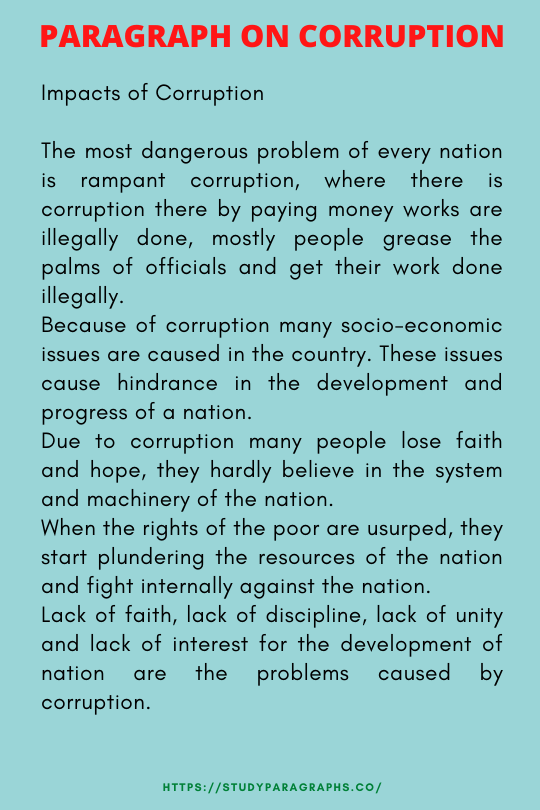Essay on How to Stop Corruption: A Comprehensive Guide
Corruption, a pervasive and complex challenge, infiltrates societies globally, eroding trust in institutions, impeding economic development, and unraveling societal fabric. This essay delves into the strategies and measures necessary to curb corruption and cultivate an environment of transparency and accountability.
Effective Strategies to Combat Corruption: An In-depth Essay on Eradicating Corruption
Corruption is a multifaceted issue threatening societies all around the globe. It is the abuse of entrusted power for private gain, often leading to detrimental effects on social and economic development and the overall quality of life. It’s a problem that has been with us throughout history. Despite numerous efforts to eradicate it, corruption remains a significant hindrance to social and economic progress.
The
Path to Curb Corruption: Legal Frameworks and Institutions
Firstly, strengthening legal frameworks and institutions is vital in the fight against corruption. By enacting and enforcing comprehensive anti-corruption laws, societies can lay a solid foundation to bolster transparency and accountability. Independent and impartial anti-corruption agencies should be established, ensuring the enforcement of these laws. Additionally, public procurement processes must be transparent and accountable to prevent the misuse of public funds.
Transparency and Accountability: Tools for Change
Promoting transparency and accountability is another effective strategy in combating corruption. Open government initiatives can increase access to information, ensuring citizens are informed and can hold public officials accountable. Leveraging technology can also enhance transparency in government operations. Moreover, mechanisms should be established for citizens to report corruption anonymously and protect whistleblowers, fostering an environment where citizens can actively contribute to the fight against corruption.
Enhancing Public Sector Integrity: The Role of Ethical Behavior
Promoting ethical behavior and integrity among public officials is crucial. Training and awareness programs can instill a culture of ethics and integrity. Measures to prevent conflicts of interest and promote merit-based appointments can ensure that positions of power are not misused. Strengthening internal control systems and audit mechanisms can also help detect and prevent corruption.
Citizen Participation and Engagement: Mobilizing the Masses
Encouraging active citizen participation in decision-making processes can significantly contribute to curbing corruption. Civic education can raise awareness about the negative impacts of crime and empower citizens to hold public officials accountable.
Strengthening International Cooperation: A United Front Against Corruption
Collaborating with international organizations and other countries can help combat cross-border corruption. By ratifying and implementing international conventions and agreements against corruption, countries can unite against this global issue. Facilitating the recovery of stolen assets through international cooperation can also deter corrupt practices.
Resources and Political Will: The Driving Force
Finally, adequate resources and political will are indispensable in the fight against corruption. Allocating sufficient resources to anti-corruption efforts, including funding for investigations and prosecutions, is necessary. Demonstrating political will at all levels of government is crucial for tackling corruption effectively.
Effects Ff Corruption Essay
Corruption is a complex issue that plagues societies worldwide, and it comes with a host of detrimental effects. Often perceived as a hurdle to economic development, corruption undermines the rule of law, exacerbates wealth inequality, and hampers social progress.
Financially, corruption siphons off valuable resources meant for public services, leading to the degradation of infrastructure, education, and healthcare. Investments are deterred, as businesses are reluctant to operate in environments rife with corruption due to the level of uncertainty and the lack of fair competition. This economic stagnation affects the most vulnerable members of society, widening the gap between the haves and the have-nots.
Legally, corruption erodes trust in the public sector. Bribes and kickbacks to officials distort the rule of law, as decisions are often made in favor of the highest bidder rather than in the public’s best interest. This loss of trust in public institutions threatens the foundation of democracies and can destabilize political structures.
Socially, corruption fosters a culture of dishonesty, creating societal norms that accept and even encourage corruption. A society riddled with corruption often sees a decline in moral standards, as integrity and honesty are overlooked. This further perpetuates the cycle of corruption, making it increasingly difficult to eradicate.
Conclusion
Corruption is a significant impediment to societal progress. Its effects are far-reaching, affecting economic development, legal structures, and even the societal fabric. Therefore, it is imperative to combat corruption through a combination of stringent laws, transparent governance, and public awareness. The fight against corruption is not solely the government’s responsibility; it is a collective effort that requires each citizen’s active participation.
Conclusion: Towards a Transparent, Accountable Future
Stopping corruption requires a multifaceted approach involving legal reforms, transparency and accountability measures, citizen engagement, international cooperation, and political will. A transparent, accountable, and corruption-free future is possible if societies worldwide are committed to implementing these strategies. There is no one-size-fits-all solution to corruption, but meaningful progress can be achieved with sustained efforts and a long-term commitment.

Hello! Welcome to my Blog StudyParagraphs.co. My name is Angelina. I am a college professor. I love reading writing for kids students. This blog is full with valuable knowledge for all class students. Thank you for reading my articles.



